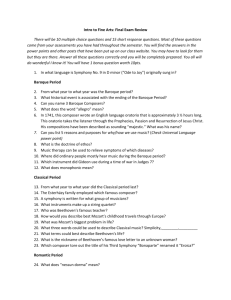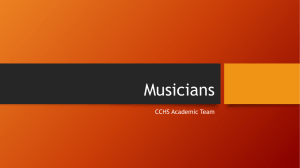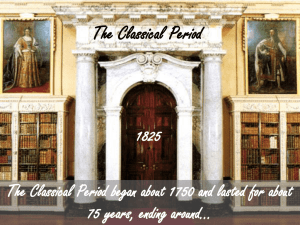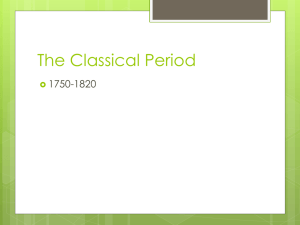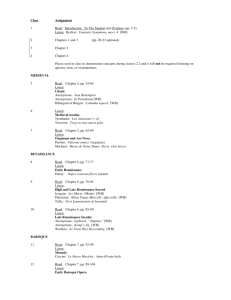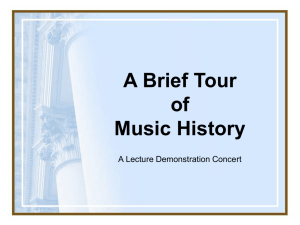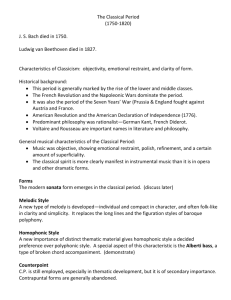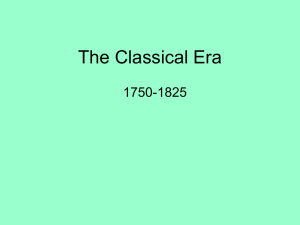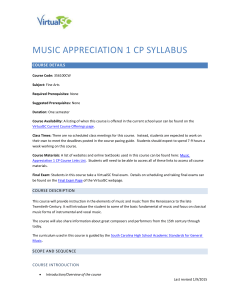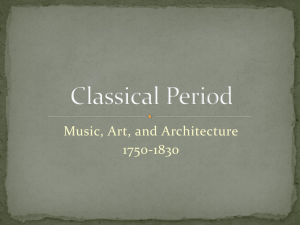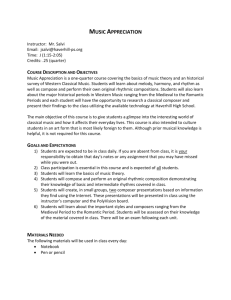Classical Period
advertisement
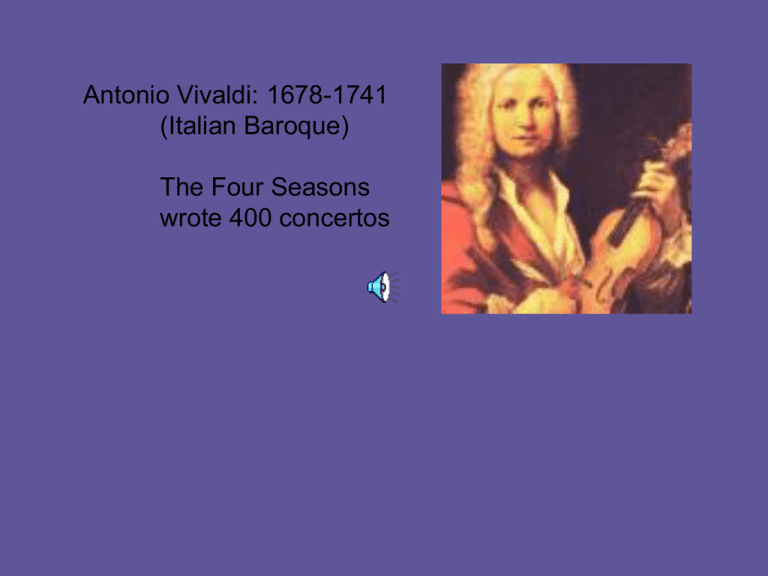
Antonio Vivaldi: 1678-1741 (Italian Baroque) The Four Seasons wrote 400 concertos George Frideric Handel: 1685-1759 (Baroque) Messiah Water Music Music for the Royal Fireworks Johann Sebastian Bach: 1685-1750 (Baroque) Brandenburg Concertos The Well-Tempered Clavier St. Matthew Passion Joseph Haydn: 1732-1809 (Classical) Known as Father of the Symphony Farewell Symphony Surprise Symphony Wolfgang Amadeus Mozart: 1756-1791 (Classical) Operas: The Magic Flute Don Giovanni Jupiter Symphony A Little Night Music Ludwig Van Beethoven: 1770-1827 (Romantic) Symphony No. 3 in E-Flat (Eroica) only wrote one opera: Fidelio “Ode to Joy” - last movement of 9th symphony Moonlight Sonata Für Elise known for his 9 symphonies deaf in later life Giocchino Rossini: 1792-1868 (Italian Opera) The Barber of Seville Overture to William Tell Felix Mendelssohn: 1809-1847 (Romanticism) Overture to A Midsummer Night’s Dream Wedding March Frederic Chopin: 1810-1849 (Romanticism) lover of George Sand (the female novelist) Polish pianist Minute Waltz Franz Liszt: 1811-1886 (Romanticism) one of the greatest pianists in history Hungarian Rhapsodies Richard Wagner: 1813-1883 (Romanticism) German opera The Flying Dutchman Tannhauser Lohengrin Tristan and Isolde The Ring of the Nibelung Giuseppe Verdi: 1813-1901 (Foremost Italian opera composer) Rigoletto La Traviata Aida Otello Johann Strauss II: 1825-1899 (The Waltz King) By the Beautiful Blue Danube Tales from the Vienna Woods Die Fledermaus (The Bat - operetta) Stephen Foster: 1826-1864 (US composer of popular songs) Beautiful Dreamer My Old Kentucky Home Oh! Susanna Swanee River or Old Folks at Home Johannes Brahms:: 1833-1897 (Classical) Brahms Lullaby Academic Festival Overture Symphony No. 1 in C Minor Violin Concerto in D Quintet for Clarinet and Strings in B Minor Georges Bizet:: 1838-1875 (French) Carmen (opera) Peter Ilich Tchaikovsky:: 1840-1893 (Russian) 1812 Overture First Piano Concerto Nutcracker Suite Sixth Symphy, the Pathetique Swan Lake Sleeping Beauty Sir Arthur Sullivan: 1842-1900 (the other half of W. S. Gilbert known for their comic operas) The Mikado H. M. S. Pinafore The Pirates of Penzance Onward Christian Soldiers Claude Debussy: 1862-1918 (French pianist known for musical Impressionism) Prelude to L’Apres-Midi d’un Faune (Afternoon of a Faun The Preludes Clair de Lune Scott Joplin: 1868-1917 (Pulitzer Prize-winning American pianist and father of ragtime) Maple Leaf Rag Maurice Ravel: 1875-1937 (French Composer) Bolero Igor Stravinsky: 1882-1971 (Russian Composer) Petrushka The Firebird Suite The Rite of Spring Sergei Prokofiev: 1891-1953 (Russian Composer) Peter and the Wolf Romeo and Juliet George Gershwin: 1898-1937 (U.S. Composer) Rhapsody in Blue An American in Paris Porgy and Bess (opera) songs: Summertime I Got Plenty o’ Nuthin’ Bess, You Is My Woman Now It Ain’t Necessarily So other songs: I Got Rhythm Let’s Call the Whole Thing Off Someone to Watch Over Me They Can’t Take That Away from Me Aaron Copland: 1900-1990 (U.S. Composer) Rodeo (ballet) Appalachian Spring (written for Martha Graham’s dance company) Billy the Kid (ballet) Fanfare for the Common Man John Philip Sousa - The March King The Stars and Stripes Forever Irving Berlin -Alexander’s Ragtime Band -Blue Skies -God Bless America -White Christmas" -There's No Business Like Show Business Baroque Period Three of the greatest geniuses of this period were Vivaldi, Bach and Handel. During this time, the first operas appeared in Italy. The orchestra began to take its modern shape, and forms like the sonata (for piano and one other instrument) and concerto (for solo instrument and orchestra) emerged. Most Baroque music is highly decorated with very complex melodies. Classical Period The death of Johann Sebastian Bach in 1750 signaled the end of the Baroque period and the introduction of a style of music now called Classical, which is plainer and more disciplined. Classical music was often written on a larger scale, and its finest expression is the fourmovement symphony. Haydn and Mozart, the greatest composers of the Classical period, also brought the sonata and the concerto to a high degree of perfection. Romantic Period Ludwig van Beethoven, who began as a Classical composer, broke the mold with his revolutionary “Eroica” in 1804 and dominated the musical scene until 1827. European music would never be the same again. Precise forms became less important than the expression of powerful feelings, and Romantic composers like Schubert, Mendelssohn and Tchaikovsky put emotion into music as no one had ever done before. At the same time, Liszt, Dvorak and Grieg began using music to express patriotic sentiments. Modern Period The early 1900s saw the beginning of the Modern period, which is much more diverse and complicated. All the traditional rules of music have been challenged, including seemingly basic principles of harmony and rhythm. Some 20th-century music is harsh and difficult to appreciate. But Modern composers like Holst, Debussy, Stravinsky and Copland have entered the mainstream and will be enjoyed for as long as music is played.
